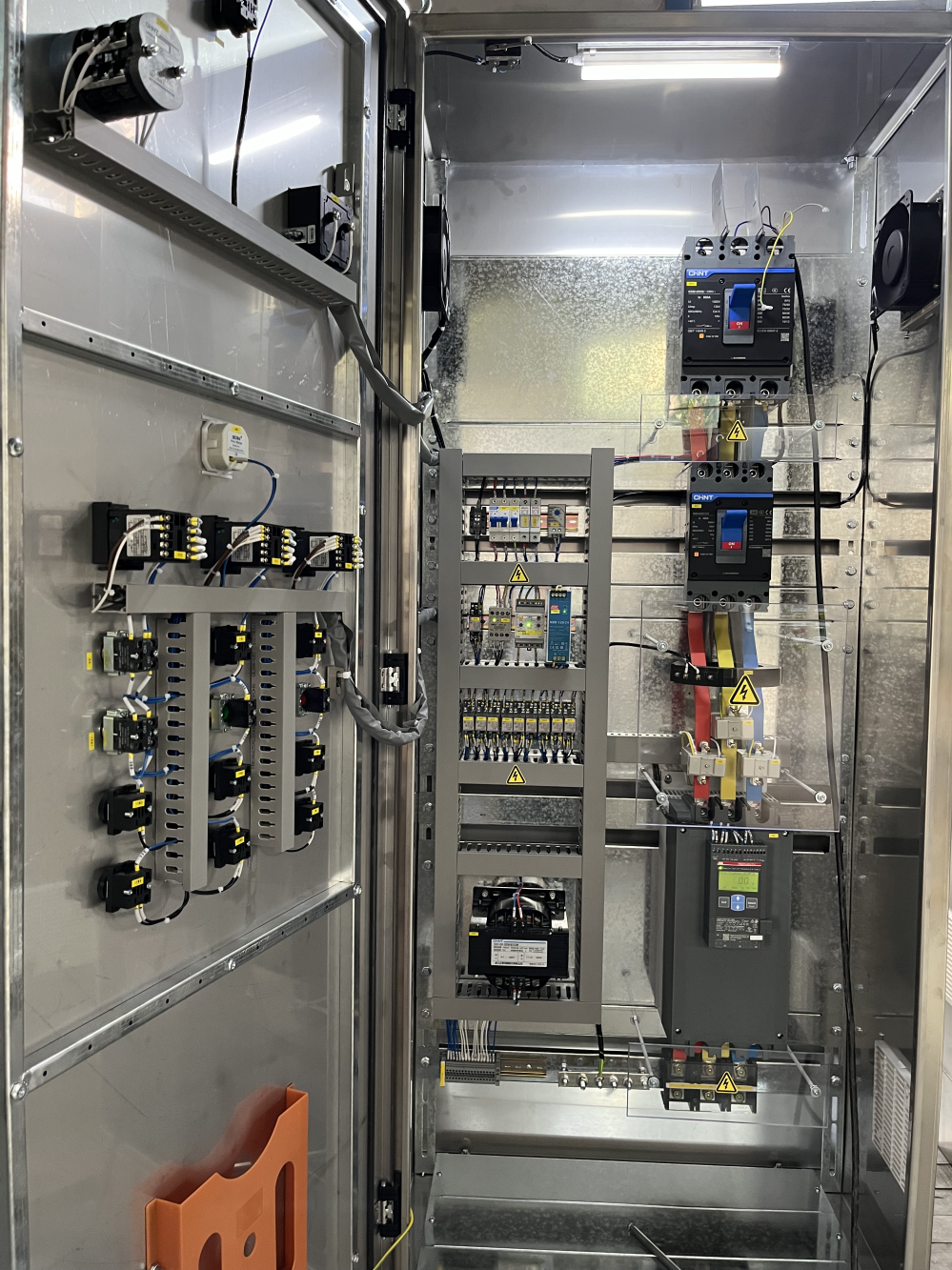What Are Motor Control Centers? Core Components Explained
Defining Motor Control Centers in Industrial Automation
Motor Control Centers (MCCs) play a pivotal role in industrial automation by acting as centralized systems for managing and controlling electric motors. In various industrial settings, MCCs integrate multiple electrical components to streamline the operations and management of motor functions. These centers are crucial for ensuring efficient and safe control over motors used in manufacturing and processing environments. By centralizing motor control, MCCs reduce the complexity of motor management, which enhances operational reliability. Evidence in the field demonstrates that implementing MCCs can lead to improved system performance, thus proving their importance in industries relying on automated motor functions.
Critical Components: Power Distribution Boxes and Sub Panel Boxes
Power distribution and sub panel boxes are vital components within the architecture of Motor Control Centers. Firstly, power distribution boxes ensure efficient electrical power distribution to various motor control units. Meanwhile, sub panel boxes manage the electrical load and maintain voltage regulation, which is crucial within the MCC framework. These components contribute to system safety by isolating power circuits for maintenance, thus enhancing the overall system integrity. Experts agree that the effective integration of power distribution boxes and sub panel boxes within MCCs optimizes the performance and reliability of motor control systems, making them indispensable in complex operations.
Circuit Protection and Control Devices in MCC Architecture
Circuit protection devices are indispensable for safeguarding motor circuits within Motor Control Centers. Devices such as fuses and circuit breakers are crucial in protecting against overloads and faults that might harm the motors. Additionally, control devices like contactors and relays are essential for managing the start and stop functions of motors, playing a significant role in the operational efficiency of MCCs. The installation of these devices ensures compliance with safety standards and enhances operational continuity should electrical issues arise. Statistical analyses support the value of circuit protection measures, indicating that they can prevent equipment damage and enhance overall system uptime, thereby underscoring the importance of these devices in robust MCC architecture.
Key Advantages of Centralized Motor Control Systems
Streamlined Operations and Reduced Downtime
Centralized Motor Control Centers (MCCs) play a pivotal role in streamlining industrial operations and minimizing downtime. By offering a centralized approach, MCCs simplify maintenance tasks, making it easier for technicians to identify and resolve issues promptly. This ease of maintenance contributes to faster diagnosis and rectification, significantly reducing downtime in industrial operations. Studies have shown that organizations implementing MCCs witness a marked decrease in operational interruptions due to enhanced control mechanisms. Moreover, the centralized nature of MCCs simplifies training requirements for personnel, who only need to familiarize themselves with a single system rather than multiple decentralized ones, further contributing to operational efficiency.
Cost Savings Through Scalable Power Management
One of the notable benefits of MCCs is the provision of scalable power management solutions, which are adaptable to fluctuating production demands. By utilizing a centralized system, businesses not only streamline their operations but also considerably cut down on energy consumption and operational costs. Industry reports consistently indicate that the initial investment associated with MCCs can lead to substantial and impressive long-term savings. This scalability further allows enterprises to expand their operations without needing a comprehensive redesign of their electrical systems, thereby enhancing the system's cost-effectiveness. MCCs enable businesses to accommodate growth seamlessly, fostering both financial savings and strategic flexibility in a competitive market.
Integrating MCCs with Power Distribution Infrastructure
Role of Sub Panel Boxes in Voltage Regulation
Sub panel boxes play a crucial role in the regulation of voltage and current across Motor Control Centers (MCCs). Their function as intermediary distribution points enhances the efficiency of power delivery to motors by maintaining consistent voltage levels, which are paramount for optimal motor performance. Research indicates that effective voltage management not only improves efficiency but also significantly extends the lifespan of motors, making it an essential aspect of industrial operations. By integrating sub panel boxes with MCC systems, businesses can ensure localized control and management of electricity, thereby enhancing safety and minimizing risks associated with electrical faults.
Optimizing Energy Flow via Power Distribution Box Networks
Power distribution box networks are essential components in controlling electricity flow within MCCs, leading to optimized energy use. They ensure load balancing, which prevents overloads and promotes sustainable energy consumption practices, effectively reducing energy costs. Studies suggest that enterprises employing advanced power distribution strategies achieve higher efficiency, allowing them to lower overall energy expenses. The incorporation of smart technologies into power distribution boxes further enhances this optimization by enabling real-time monitoring and management, facilitating precise control over energy flow. This targeted approach not only supports operational efficiency but also aligns with sustainability goals by minimizing unnecessary energy waste.
Enhancing Efficiency Through Smart MCC Technologies
IoT-Driven Predictive Maintenance Strategies
Integrating Internet of Things (IoT) technology into Motor Control Centers (MCCs) paves the way for advanced predictive maintenance strategies. By facilitating real-time monitoring of motor health, IoT enables organizations to proactively address maintenance issues before they lead to costly breakdowns. For example, data analytics derived from cloud-based platforms can predict potential failures, significantly reducing unplanned downtimes. According to industry experts, employing IoT in MCCs can improve maintenance efficiency by up to 30%, translating to enhanced operational effectiveness. Embracing IoT-driven maintenance approaches aligns with modern industrial practices, allowing businesses to adopt a proactive rather than a reactive stance.
Aligning with Industry 4.0 for Real-Time Monitoring
The incorporation of Industry 4.0 technologies into MCCs transforms them into sophisticated systems capable of real-time data acquisition and analysis. This technological evolution enhances the ability of managers to obtain operational insights, facilitating rapid and informed decision-making. Reports have shown that businesses adopting Industry 4.0 principles experience a noticeable increase in productivity and transparency in processes. Real-time monitoring, a cornerstone of Industry 4.0, creates a framework for continuous improvement by enabling instantaneous adjustments to operations. By promoting an agile environment, Industry 4.0 technologies empower organizations to optimize performance and drive sustainable growth.
Industrial Applications: Where MCCs Deliver Maximum Impact
Water Treatment Plants and Desalination Projects
Motor Control Centers (MCCs) play a crucial role in water treatment plants and desalination projects by optimizing the control and management of vital processes. MCCs provide systematic workflow, ensuring that each step in complex treatment processes is carefully managed. They're particularly effective in managing energy consumption, which is crucial for maintaining environmental compliance — a requirement in desalination projects which demands precision and efficiency. Statistics underscore that utilizing MCCs can achieve up to a 20% reduction in operational costs, primarily due to enhanced efficiencies in energy use and process management. This improvement in efficiency not only ensures compliance but also boosts reliability and performance, which are vital for maintaining public utilities.
Petrochemical Facilities and Hazardous Environment Compliance
In the realm of petrochemical facilities, MCCs are indispensable for complying with safety protocols tailored to hazardous environments. They are designed to integrate robust circuitry critical for the safe operation in settings where risks of explosions or operational failures are prevalent. Compliance with industry regulations is a central feature of these systems, ensuring reduced risks and enhanced safety performance metrics. Research indicates significant improvements in operational reliability when MCCs are incorporated. Their resilience against harsh conditions further underscores their importance, as MCCs are designed to withstand and operate efficiently, maintaining productivity and upholding safety standards in petrochemical production. The capability of MCCs to adapt to challenging environments and provide reliable operation makes them a cornerstone in industrial safety and performance optimization.
FAQ Section
What are the main components of Motor Control Centers?
Motor Control Centers often include power distribution boxes, sub panel boxes, circuit protection devices, and control devices such as fuses, circuit breakers, contactors, and relays.
How do MCCs contribute to reducing energy costs?
MCCs facilitate scalable power management, allowing businesses to optimize energy use by balancing loads and integrating smart technologies for real-time energy flow monitoring, leading to reduced energy costs.
What advantages do IoT technologies offer in MCCs?
IoT technologies enable real-time monitoring and predictive maintenance strategies in MCCs, reducing the risk of breakdowns and improving maintenance efficiency, which enhances overall operational effectiveness.
Table of Contents
-
What Are Motor Control Centers? Core Components Explained
- Defining Motor Control Centers in Industrial Automation
- Critical Components: Power Distribution Boxes and Sub Panel Boxes
- Circuit Protection and Control Devices in MCC Architecture
- Key Advantages of Centralized Motor Control Systems
- Streamlined Operations and Reduced Downtime
- Cost Savings Through Scalable Power Management
- Integrating MCCs with Power Distribution Infrastructure
- Role of Sub Panel Boxes in Voltage Regulation
- Optimizing Energy Flow via Power Distribution Box Networks
- Enhancing Efficiency Through Smart MCC Technologies
- IoT-Driven Predictive Maintenance Strategies
- Aligning with Industry 4.0 for Real-Time Monitoring
- Industrial Applications: Where MCCs Deliver Maximum Impact
- Water Treatment Plants and Desalination Projects
- Petrochemical Facilities and Hazardous Environment Compliance
- FAQ Section


